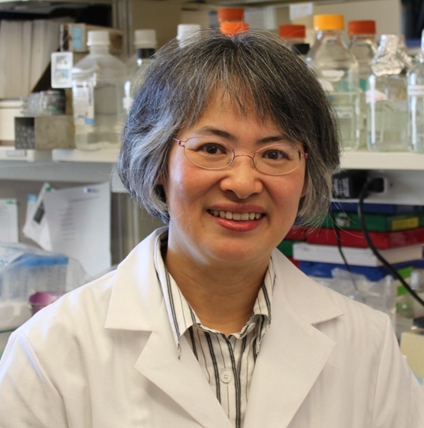Xiao Zhen Zhou | Overview
 Xiao Zhen Zhou, MD, is an Assistant Professor at Beth Israel Deaconess Medical Center, Harvard Medical School. Proline-directed phosphorylation is a central signaling mechanism in health and disease, but little was known whether it is further regulated after phosphorylation until the discovery of the unique enzyme Pin1. In working with the long-term collaborator Dr. Kun Ping Lu, Dr. Zhou establishes the basic principle how Pin1 binds and isomerizes cis-trans conformational changes after phosphorylation to regulate protein function. As a unique signaling mechanism, Pin1-catalyzed cis-trans isomerization regulates numerous important molecules, notably tau after phosphorylation on the pT231-Pro motif in Alzheimer’s disease. However, unlike phosphorylation and dephosphorylation, there was no tool to detect the conformational regulation after phosphorylation. Dr. Zhou developed innovative peptide chemistry to generate the first polyclonal and then monoclonal antibodies that are able to distinguish cis from trans isomer of the pT231-Pro motif in tau, a technology she has now successfully applied to several other Pin1 substrates. This new generation of conformation-specific mAbs has not only uncovered novel signaling and disease mechanisms, but also may lead to promising new diagnostics and therapeutics for treating Pin1-related diseases. Notably, Dr. Zhou and Dr. Lu have discovered that cis tau is the early pathogenic conformation leading to neurodegeneration in Alzheimer’s. They have further discovered cis P-tau as a major mediator of early brain damage after traumatic brain injury, which might function as "prion" to cause and spread progressive neurodegeneration in chronic traumatic encephalopathy. Notably, in human head injury due to a variety of causes, cis P-tau is induced in brains and cerebrospinal fluid, and positively correlates with brainl injury severity and clinical outcome. Cis P-tau elimination in pre-clinical models of severe or repetitive brain injury with antibody attenuates the development of neuropathology and brain dysfunction during acute and chronic phases including chronic traumatic encephalopathy-like pathology and dysfunction after repetitive brain injury. Dr. Zhou and Dr. Lu are actively translating these new discoveries to develop potential new diagnoses, preventions and treatments for the sequelae of repetitive concussions including chronic traumatic encephalopathy.
Xiao Zhen Zhou, MD, is an Assistant Professor at Beth Israel Deaconess Medical Center, Harvard Medical School. Proline-directed phosphorylation is a central signaling mechanism in health and disease, but little was known whether it is further regulated after phosphorylation until the discovery of the unique enzyme Pin1. In working with the long-term collaborator Dr. Kun Ping Lu, Dr. Zhou establishes the basic principle how Pin1 binds and isomerizes cis-trans conformational changes after phosphorylation to regulate protein function. As a unique signaling mechanism, Pin1-catalyzed cis-trans isomerization regulates numerous important molecules, notably tau after phosphorylation on the pT231-Pro motif in Alzheimer’s disease. However, unlike phosphorylation and dephosphorylation, there was no tool to detect the conformational regulation after phosphorylation. Dr. Zhou developed innovative peptide chemistry to generate the first polyclonal and then monoclonal antibodies that are able to distinguish cis from trans isomer of the pT231-Pro motif in tau, a technology she has now successfully applied to several other Pin1 substrates. This new generation of conformation-specific mAbs has not only uncovered novel signaling and disease mechanisms, but also may lead to promising new diagnostics and therapeutics for treating Pin1-related diseases. Notably, Dr. Zhou and Dr. Lu have discovered that cis tau is the early pathogenic conformation leading to neurodegeneration in Alzheimer’s. They have further discovered cis P-tau as a major mediator of early brain damage after traumatic brain injury, which might function as "prion" to cause and spread progressive neurodegeneration in chronic traumatic encephalopathy. Notably, in human head injury due to a variety of causes, cis P-tau is induced in brains and cerebrospinal fluid, and positively correlates with brainl injury severity and clinical outcome. Cis P-tau elimination in pre-clinical models of severe or repetitive brain injury with antibody attenuates the development of neuropathology and brain dysfunction during acute and chronic phases including chronic traumatic encephalopathy-like pathology and dysfunction after repetitive brain injury. Dr. Zhou and Dr. Lu are actively translating these new discoveries to develop potential new diagnoses, preventions and treatments for the sequelae of repetitive concussions including chronic traumatic encephalopathy.
